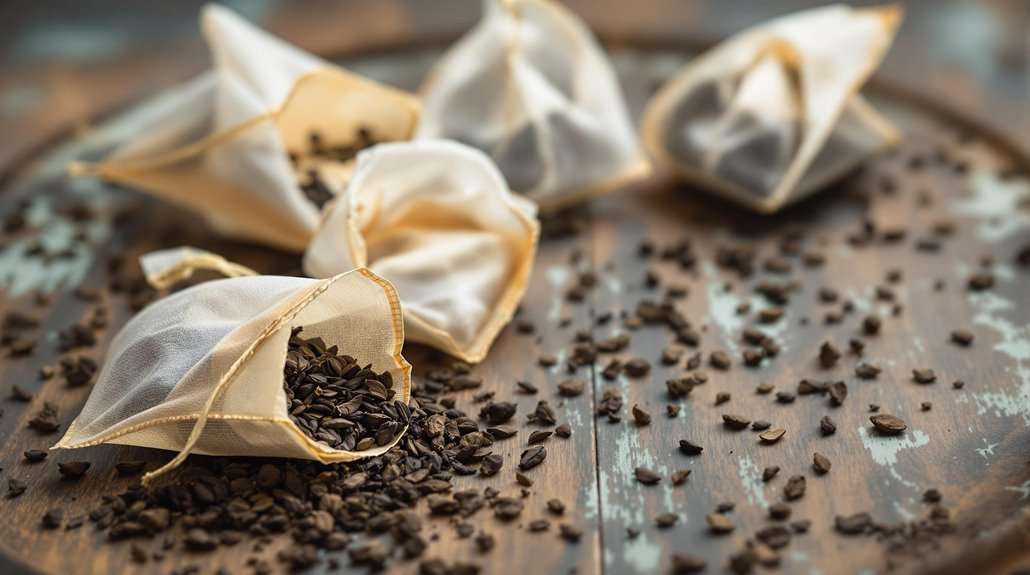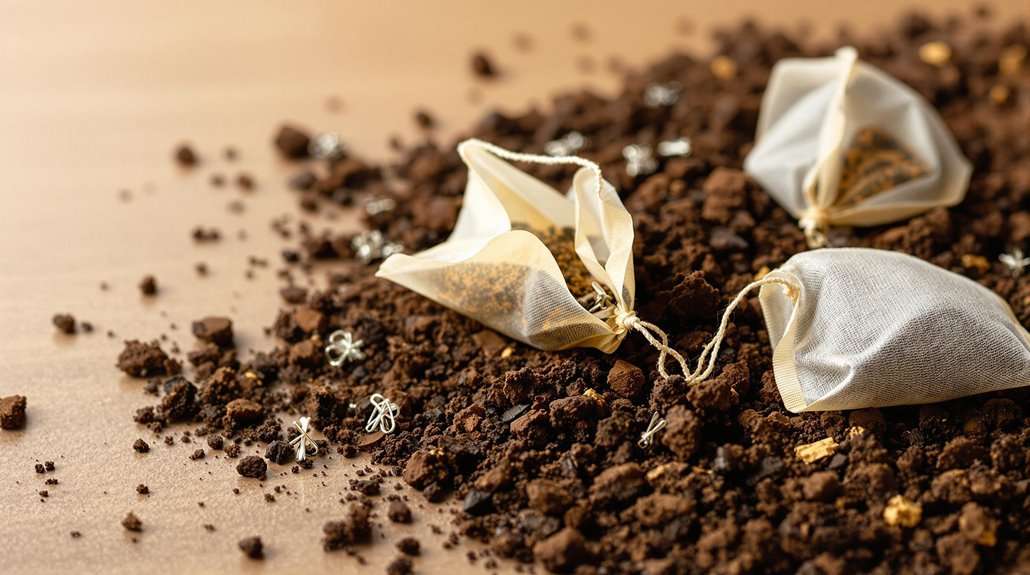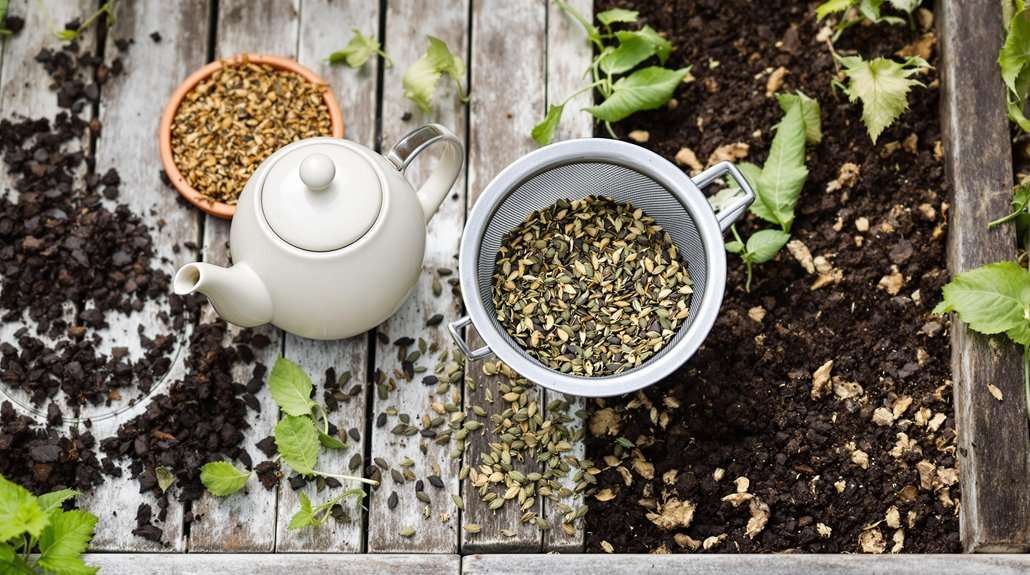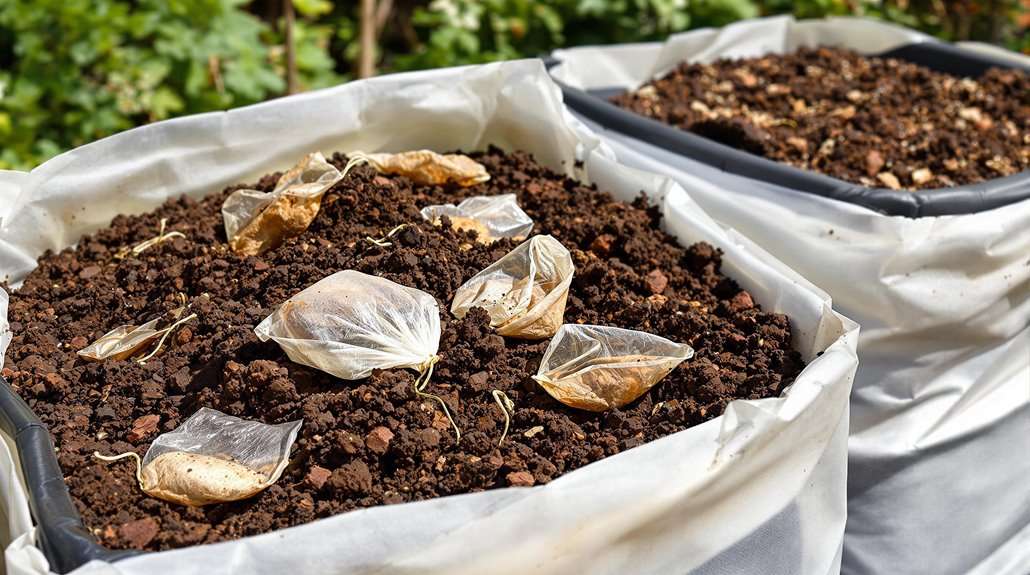Are Tea Bags Good for Compost
You can compost tea bags, but you'll need to check their composition first. While traditional paper tea bags made from natural fibers are completely compostable, many modern tea bags contain 20-30% plastic fibers for heat sealing, which won't break down in your compost pile. Look for labels indicating "certified home compostable," "plant-based," or "cellulose" materials. Before composting, remove any staples, tags, or strings, and consider switching to loose-leaf tea with reusable strainers for a more eco-friendly option. The tea leaves themselves are excellent for composting, adding valuable nitrogen to your pile. Understanding the specifics of tea bag materials will help you make better composting decisions.
This post may contain affiliate links. If you make a purchase through these links, I may earn a commission at no additional cost to you. Additionally, portions of this post may be generated using artificial intelligence (AI) technology. While we strive for accuracy, please be aware that AI-generated content may not always be perfect and should be fact-checked when necessary.
The Spatula Scoops
- Tea leaves are excellent for compost as they add nitrogen and support healthy soil development when properly decomposed.
- Many conventional tea bags contain 20-30% plastic, making them unsuitable for composting and potentially harmful to soil health.
- Only use tea bags labeled as "certified home compostable," "plant-based," "hemp," or "cellulose" for composting.
- Remove staples, tags, and strings before composting tea bags, as these components can contaminate the compost pile.
- Loose-leaf tea is the best option for composting, eliminating concerns about bag materials and potential plastic contamination.
Understanding Tea Bag Materials

Diving into tea bag materials reveals a complex mix of components that affect their compostability. You'll find that most conventional tea bags aren't made purely from natural materials, as they often contain 20-30% plastic fibers that help with heat sealing and durability. These plastic components can persist in your compost pile, potentially introducing unwanted elements into your soil. Easy-open tear notches and resealable features are becoming increasingly common in modern tea bags, adding another layer of non-compostable materials to consider.
When you're examining your tea bags, you'll notice several common materials. Paper-based bags, while seemingly eco-friendly, typically include synthetic fibers for strength. Silken tea bags, despite their luxurious appearance, are actually made from PET or nylon, making them unsuitable for composting. The more environmentally conscious options include PLA (Polylactic Acid) and Soilon bags, which are derived from plant starches and will break down naturally. String-and-tag varieties present a mixed bag – some are purely paper-based and compostable, while others contain hidden plastic components. If you're particularly concerned about composting, look for tea bags specifically labeled as biodegradable or those made from unbleached, natural filter paper that doesn't include synthetic binding agents. In contrast, kitchen essentials like Pyrex measuring cups are made of high-quality tempered glass, ensuring a non-toxic and durable addition to your kitchen.
Environmental Impact of Tea Bags
You'll find that many tea bags release microplastics into your soil, with studies showing that a single tea bag can shed billions of microscopic plastic particles during decomposition. Your daily tea habit might be contributing more waste than you realize, as millions of tea bags end up in landfills each day, where they continue to leach harmful substances into the environment. With 96 percent of teabags containing non-biodegradable polypropylene, the problem is more widespread than most people realize. When you consider that the average household discards hundreds of tea bags annually, the cumulative impact on soil health and waste management becomes a significant environmental concern that requires immediate attention. Furthermore, switching to eco-friendly alternatives like reusable silicone bags can help reduce single-use plastic waste and minimize harm to the environment.
Microplastic Release in Soil
According to recent studies, tea bags pose a vital environmental concern due to their microplastic content. When you dispose of tea bags in your compost or soil, they can release harmful microplastics, particularly from the polypropylene sealants used in their construction. This contamination disrupts the natural soil ecosystem and affects nutrient turnover processes. With 96 percent of UK teabags containing non-biodegradable polypropylene, the scale of this environmental issue is massive.
- Polypropylene sealants in tea bags don't biodegrade, leading to long-term soil contamination
- Even PLA-based alternatives can harm earthworms and other beneficial soil organisms
- Microplastics from tea bags can leach into groundwater and waterways
- Non-biodegradable components like staples and adhesives contribute to soil pollution
- The accumulation of these materials can profoundly impact soil health over time
You'll find that these microplastics persist in your soil long after the tea bag appears to have decomposed. They're particularly problematic because they can bind with other pollutants and create toxic combinations in your soil. While some manufacturers now offer alternatives, it's essential to check your tea bags' composition and remove any non-biodegradable components before adding them to your compost pile.
Daily Landfill Impact Statistics
The staggering volume of tea bag waste presents a pivotal environmental challenge, with over 165 million tea bags discarded daily in the UK alone. You'll find that a substantial portion of these tea bags contain polypropylene, making up 20-30% of their composition, which doesn't break down in landfills or composting facilities.
When you're disposing of tea bags, it's vital to understand that not all of them are created equal. Traditional tea bags often contain non-compostable materials, including heat-sealed edges and plastic components, which contribute markedly to landfill waste. Even when you've placed them in green waste bins, these materials persist in the environment. Tea bags that are heat-sealed at edges should be carefully examined before composting, as they may contain non-biodegradable elements.
Your daily tea consumption choices can make a difference in reducing landfill impact. By selecting tea bags made from plant-based materials like paper, silk, or muslin, you're actively contributing to waste reduction. These fully biodegradable options break down completely in composting systems, unlike their conventional counterparts. When you multiply this small change by millions of tea drinkers, the potential reduction in landfill waste becomes substantial.
Sorting Compostable From Non-Compostable

When you're sorting tea bags for composting, you'll need to check both the material composition and any labels that indicate whether they're compostable. You can identify safe materials like paper, silk, muslin, and hemp by their natural, fibrous texture, while synthetic materials often have a slick feel or heat-sealed edges that signal they contain plastic. For certainty about your tea bags' compostability, look for explicit labeling on the box or company website, which should specify whether they're made from fully biodegradable materials suitable for home composting. Regular maintenance of your pillow can also improve sleep quality, and using Pillow Care Techniques can help extend the life of your tea bags' packaging materials. Remove any staples and adhesives from standard tea bags before adding them to your compost pile.
Identifying Safe Tea Materials
Sorting through your tea bags before composting can help you identify which materials are safe for your compost pile. When you're examining your used tea bags, look for those made from natural fibers like hemp and cellulose, which break down easily in compost environments. You'll want to pay special attention to the construction of each bag, noting any synthetic materials that could contaminate your pile.
Some tea bags contain polypropylene plastic that makes up about 30% of their composition. Here are the key materials you should evaluate in your tea bags:
- Natural fiber bags made from hemp or cellulose are completely compostable
- Paper tea bags without staples or adhesive decompose efficiently
- Organic cotton strings can safely go into your compost
- Biodegradable pyramid bags made from corn-derived materials are acceptable
- Natural loose tea leaves are always safe for composting
When you're uncertain about a tea bag's composition, check the packaging or manufacturer's website for material specifications. You'll need to remove any staples, plastic components, or synthetic fibers before adding the tea to your compost. Remember that while some brands like Yogi Tea and Newby Teas offer fully compostable options, others may contain hidden synthetic materials that don't break down properly.
Checking Bag Composition Labels
Learning to read tea bag composition labels can make the difference between a healthy compost pile and one contaminated with synthetic materials. You'll want to look for specific terms that indicate whether your tea bags are truly compostable. When you see "biodegradable" on the label, remember that this doesn't automatically mean it's suitable for home composting, as some materials require industrial facilities to break down properly.
Look for "certified home compostable" on the packaging, which confirms the absence of PLA and other synthetic materials. If you spot terms like "plant-based," "hemp," "cellulose," or "paper," these generally indicate compostable materials. However, you'll need to check for and remove any non-compostable components like staples or plastic-based strings before adding them to your pile.
Be particularly wary of labels mentioning polypropylene, as these tea bags will leave microplastics in your compost. Approximately 97.5% of UK tea consumption comes from tea bags, making proper disposal crucial. When in doubt, you can always split open the tea bag to check its composition – if it feels plasticky or doesn't tear easily, it's best to empty the tea leaves into your compost and dispose of the bag elsewhere.
Best Practices for Composting Tea
To achieve success with composting tea bags, you'll need to follow several key practices that maximize their decomposition and nutritional benefits. Before adding tea bags to your compost pile, confirm you've removed any non-compostable components like staples, tags, or string attachments that could contaminate your final product. Plant-based tea bags are ideal since they are fully biodegradable in compost.
You'll want to focus on:
- Always let your tea bags cool completely before adding them to your compost bin
- Remove and separate any non-biodegradable elements, including plastic-based materials
- Mix tea bags with other organic materials to maintain a balanced carbon-to-nitrogen ratio
- Add tea bags to different areas of your pile to promote even decomposition
- Monitor moisture levels, as tea bags can help regulate water content in your compost
- Using a stainless steel potato ricer can also help in food preparation for composting.
You'll find that tea bags break down most effectively when incorporated into a diverse compost mixture. Position them throughout your pile rather than clustering them in one spot, and maintain proper airflow by turning your compost regularly. When done correctly, you can expect your tea bags to decompose within 3-6 months, contributing valuable nutrients to your final compost product.
Sustainable Tea Drinking Alternatives

While traditional tea bags often contain hidden plastics and non-biodegradable materials, you'll find numerous sustainable alternatives that can minimize your environmental impact. Leading brands like PG Tips, Yorkshire Tea, and Clipper now offer fully biodegradable tea bags made from plant-based materials, making them perfect for composting. These eco-friendly options help reduce the release of microplastics into the environment.
For an even more sustainable option, you can switch to loose-leaf tea from eco-conscious brands like Firebelly Tea and Arbor Teas. These companies not only provide organic, fair-trade products but also use compostable packaging and support regenerative farming practices. You'll need a stainless steel strainer or reusable tea infuser, which eliminates single-use waste entirely. Proper food storage practices, such as storing curry in airtight containers at refrigerator temperature, can also contribute to a more sustainable lifestyle.
If you prefer the convenience of pre-packaged tea, look for brands like Pukka Herbs and Teabloom that use compostable tea sachets and recyclable packaging. You can enhance your sustainable tea routine by investing in durable borosilicate glass teaware or a reusable travel mug. These accessories not only reduce waste but also guarantee a clean, chemical-free brewing experience while maintaining the full flavor of your tea.
Tea Leaves as Compost Material
Tea leaves serve as an exceptional addition to your compost pile, offering a rich source of nitrogen and beneficial nutrients that accelerate decomposition. The moist tea leaves can significantly speed up the breakdown process in your compost heap. When you add tea leaves to your compost bin, you'll enhance soil structure while promoting earthworm activity, which naturally improves the overall health of your garden soil.
Here's what you need to know about composting tea bags:
- Look for tea bags made from paper, silk, or muslin, as these materials are fully compostable
- Remove staples, tags, and any non-biodegradable components before adding to your pile
- Consider opening non-compostable bags to use just the leaves, discarding synthetic materials
- Place tea bags in your bin alongside other organic materials like coffee grounds
- You can also bury compostable tea bags directly around plants for targeted fertilization
Before composting your used tea bags, always check the packaging to determine if they contain polypropylene or PET plastic. These synthetic materials won't break down and can release harmful microplastics into your soil. If you're unsure about your tea bag's composition, you'll want to stick with loose-leaf tea or certified compostable options to guarantee you're creating the healthiest possible compost for your garden.
Home Versus Industrial Composting

Composting facilities and home gardens represent two distinct approaches to breaking down organic waste, each with unique capabilities and limitations. When you're composting at home, you'll typically work with lower temperatures and less controlled conditions, which can affect how thoroughly materials break down. Industrial facilities, on the other hand, maintain precise control over temperature, moisture, and oxygen levels, making them considerably more effective at processing diverse materials. Well-maintained home compost piles can achieve 111-140°F temperatures necessary for proper decomposition.
You'll find that industrial composting facilities can handle materials that your backyard bin simply can't process effectively, particularly when it comes to tea bags containing bioplastics or polypropylene. These facilities reach the high temperatures needed to break down such materials and operate under strict regulations to guarantee complete decomposition. If you're composting at home, you'll need to be more selective about what you add to your pile. For tea bags specifically, you should check the material composition first. If they contain any plastic components, it's better to empty the tea leaves into your compost and dispose of the bag separately. Alternatively, you might consider switching to loose-leaf tea or reusable tea bags to avoid contaminating your compost with non-biodegradable materials.
Frequently Asked Questions
How Long Do Tea Bags Take to Decompose in a Home Compost Bin?
You'll find that tea bags typically take 3-6 months to decompose in your home compost bin, with 80% of households seeing full breakdown by the 4-month mark. Your composting success depends on maintaining proper moisture levels and regular turning of materials. If you're using tea bags with plastic components, they won't break down at all, so it's essential to verify you're using fully biodegradable bags before composting.
Can Used Tea Bags Repel Garden Pests When Added to Compost?
Yes, used tea bags can effectively repel garden pests when added to your compost. The tannic acid and caffeine content naturally deter insects, rodents, and other pests from eating or damaging your plants. You'll get the best results by spreading used tea bags directly on the soil or mixing them into your compost pile. For added pest control, you can also create a tea-based spritzer, which works particularly well with chamomile tea for preventing fungal issues.
Should Tea Bags Be Dried Before Adding Them to Compost?
You don't need to dry your tea bags before composting them, as moisture actually helps the decomposition process. However, it's good practice to squeeze out excess liquid after steeping to prevent your compost from becoming too wet. If you're using the tea bags directly after brewing, let them cool to room temperature first, as high heat can disrupt beneficial microorganisms in your compost pile.
Does the Type of Tea Affect Its Composting Benefits?
Ever wondered if your choice of tea matters for composting? While all tea types benefit your compost, they'll contribute differently. Black and green teas are excellent nitrogen sources, breaking down quickly to enrich your soil. Herbal teas also add valuable organic matter, though you'll need to check your tea bags for non-compostable materials. Don't worry about caffeine content – even decaffeinated teas retain their composting benefits.
Can Tea Bags With Staples or String Attachments Go in Compost?
You'll need to remove staples and non-cotton strings before composting tea bags, as these materials won't break down properly. While cotton strings are compostable, metal staples can rust and contaminate your compost. It's best to take a moment to separate these components – simply tear off the string and staple, then add only the tea bag and leaves to your compost pile. This guarantees clean, high-quality compost.





